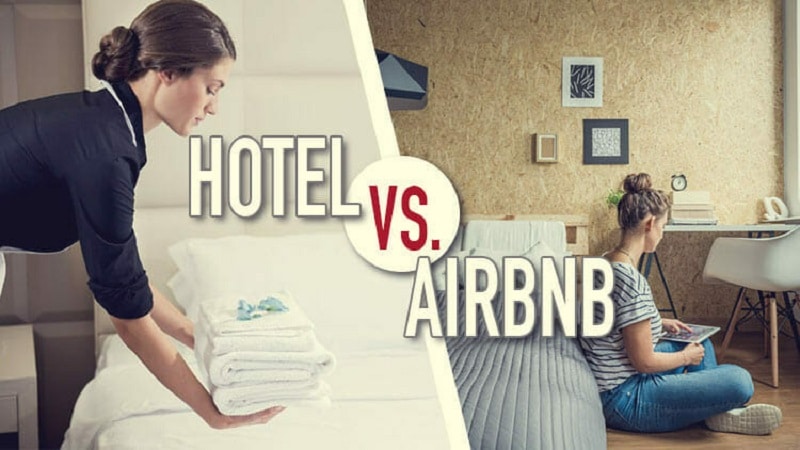Planning, preparing, and decisions are all vital cogs of the jigsaw to having the best vacation. Along the way, travelers are dragged into the gothic debate of whether to pick a hotel or an Airbnb. Their decision ultimately determines how well their trip goes.
Hotels have long been trusted as the concierge brokers until the onslaught of home-sharing siphons. With Airbnb slowly chipping away at the once solid concierge monopoly held by traditional hotels, the resounding question is often tasked to the traveler. Airbnb or Hotel?
Since Airbnb’s rewarding IPO with stock surpassing its initial asking price by over 100%, the home-sharing platform has become a viable alternative for accommodation. In fact, according to a survey by Goldman Sachs in 2016, most people who switch to Airbnb never look back.
Whereas Airbnb has become an undisputed contender, some worrying flaws still allow hotels to stake their claim for the crown. With the home-sharing platform raking up multiple complaints of scams, some travelers have become wary of rolling the dice regarding accommodation.
So, what is the perfect pick for your next vacation?
History of Hotels
The history of hotels traces back centuries to the early days of civilization. Then, travelers used to exchange goods or money for a roof over their heads for the night. But, whereas the trend began out of necessity, savvy ancient businessmen saw a new way to make money with words like ‘Hopitia,’ derived from hospitality, used for rooms commercialized in private homes.

Soon, hospitia added food and drinks to the catalog to make them more appealing in the region. And later on, different concierge amenities sprout up to beat the competition. For example, the Greeks built thermal baths for the recuperation of travelers. The Romans also built mansions to offer accommodation to travelers on government business. Also, the caravanserais were secure resting places for caravans on the Middle Eastern routes.
The hotel sector has evolved tenfold since biblical times, with technology quickly springing to the front to make for a great hotel stay. AI, crypto and Web3 are also becoming a differentiator in the sector.
History of Airbnb
Airbnb was a concept developed by friends Brian Chesky and Joe Gebbia in 2007. Brian and Joe met at the Rhode Island School of Design and initially set out as designer tour guides. But unfortunately, they couldn’t afford rent in San Francisco. And what started as a casual email conversation turned out to be a multi-billion idea that has redefined the hospitality industry.
Brian and Joe put an air mattress in their living room and offered a bed and breakfast to short-term guests who couldn’t afford to book a hotel. It expanded to AirBed & Breakfast and hence its name Airbnb.
It goes back to the question, Hotel or Airbnb?
Answering that question comes down to factors such as cost, living conditions, check-out and others. Both facilities have plenty to offer in terms of amenities. However, what amenities you access depends on how much you are willing to spend for your stay.
Why Airbnb
Airbnb homes are privately owned rental spaces run by hosts. The platform’s business model collects service fees every time a booking is made.
· More affordable
Ideally, the concept of Airbnb offered travelers a cheaper alternative to hotels. For example, for a fraction of the cost of a suite in the hotel, you can rent out a spare bedroom if you want to drive down the cost of your trip. And one of the perks of Airbnb is the ability to negotiate down prices which isn’t possible with hotels.

In a prime tourist destination, renting out a property might be wiser than staying in a hotel, making Airbnb the perfect economical option.
· Blending in with local Community
One of the perks of putting up in an Airbnb is the ability to blend right in with the local community. In contrast, hotels are found in areas surrounding service providers such as nightclubs, restaurants and other supermarkets.
Whereas such services are a welcome compliment to your stay, they often come at a high cost. Most establishments next to hotels design their prices gauging the occupants of the hotels making your overall stay costly in the long run. With Airbnb, you blend in and get the same prices as the locals.
· Much more suited for family vacations
One distinct advantage to staying in an Airbnb is that family vacations will feel much better. If you rent out the entire property, then it will feel just as it would back home. Also, having a communal place such as a living room is a big plus when you want to spend a few more hours of the day with family.
Also, you are likely to have more accommodation options for family or larger groups of people on Airbnb than you would at a hotel.
Why a hotel
A hotel offers guests lodging, meals and other complementary services depending on your budget. Some complimentary services include; a gym, swimming pool, sauna, spa, valet parking, and many others.
· Room service and professional concierge
You don’t want to be doing chores when you are supposed to have your feet up to relax. Hotels offer room services such as meals on order and general cleaning, allowing guests to enjoy their stays. We set off for vacations to have some personal time away from responsibilities and see the world in a new breadth.

We work very hard for our money, and often you want a caring partner to cater to all your needs during your vacation. A hotel will likely handle complaints about a particular service or a fault in your room better than Airbnb. In addition, the hotel sector is more competitive than Airbnb, making positive customer feedback vital to the service providers.
· Extra services and amenities
Due to the highly competitive nature of the sector, hotels have had to reinvent their models to gain a competitive edge constantly. Hotels offer complimentary services such as swimming pools, heated beds, valet parking, a gym, a spa, and a sauna.
· Greater sense of security
You will likely have more sound sleep in a hotel than in an Airbnb. With clearly marked emergency exit points, security and functional fire suppression systems.
What is the verdict?
Hotels are easier to find, have no chores, and offer assistance by calling the front desk. However, you will spend more on lodging and meals. Airbnb’s are private, frequently less expensive, and allow you to live like a local while saving money on food.
However, it would help if you did some homework on the neighborhoods and transportation, and their amenities and services can occasionally be less reliable than hotels. Finding a stay that meets your requirements and preferences is key to finding fanciful accommodation.




